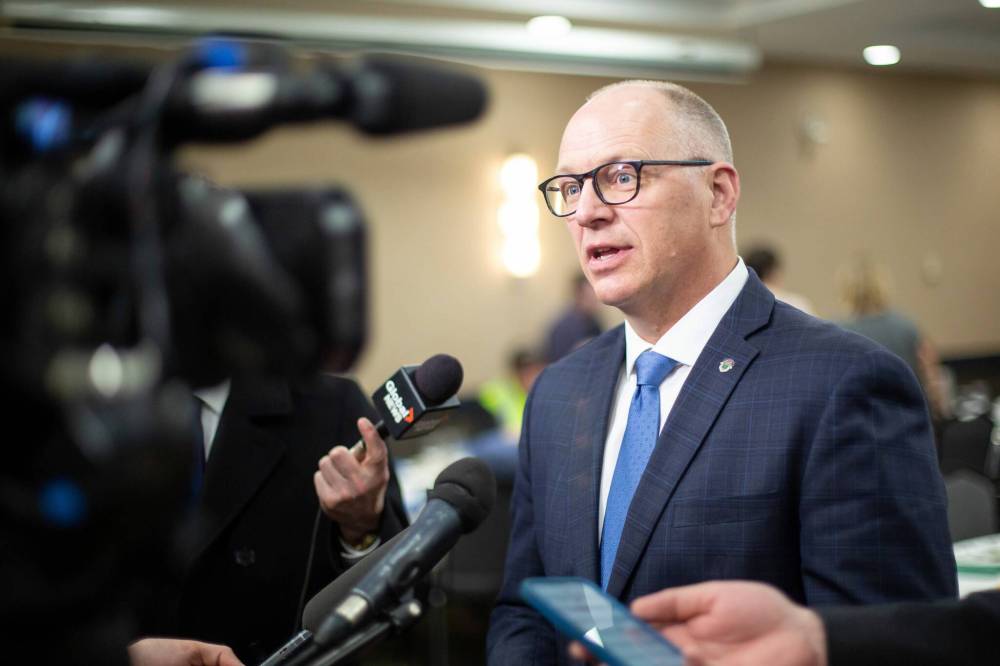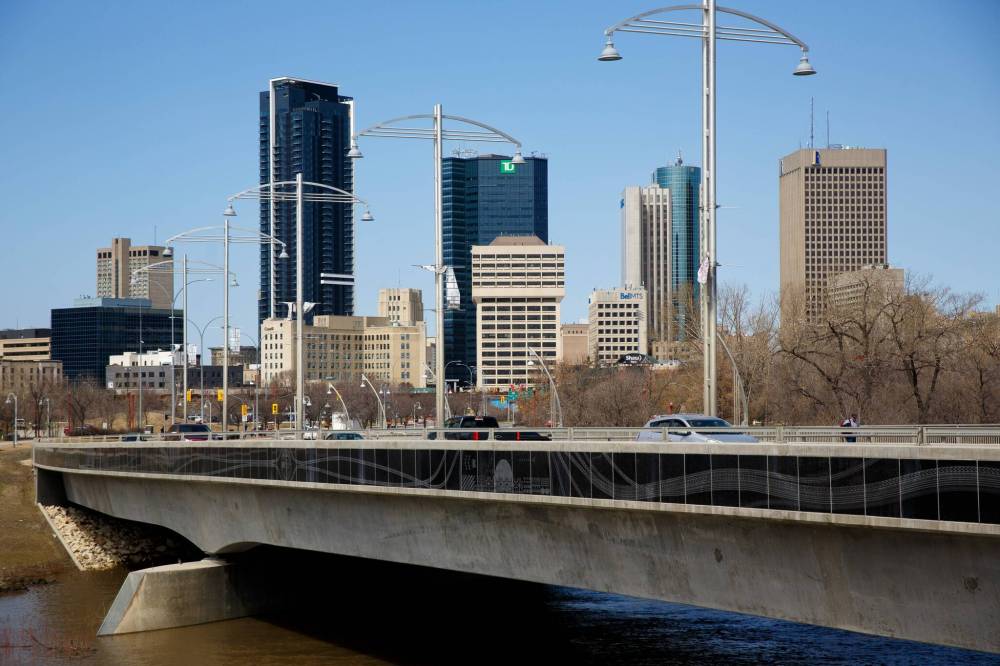City budget balances between skyrocketing costs, escalating needs
Read this article for free:
or
Already have an account? Log in here »
To continue reading, please subscribe:
Monthly Digital Subscription
$0 for the first 4 weeks*
- Enjoy unlimited reading on winnipegfreepress.com
- Read the E-Edition, our digital replica newspaper
- Access News Break, our award-winning app
- Play interactive puzzles
*No charge for 4 weeks then price increases to the regular rate of $19.95 plus GST every four weeks. Offer available to new and qualified returning subscribers only. Cancel any time.
Monthly Digital Subscription
$4.99/week*
- Enjoy unlimited reading on winnipegfreepress.com
- Read the E-Edition, our digital replica newspaper
- Access News Break, our award-winning app
- Play interactive puzzles
*Billed as $19.95 plus GST every four weeks. Cancel any time.
To continue reading, please subscribe:
Add Free Press access to your Brandon Sun subscription for only an additional
$1 for the first 4 weeks*
*Your next subscription payment will increase by $1.00 and you will be charged $16.99 plus GST for four weeks. After four weeks, your payment will increase to $23.99 plus GST every four weeks.
Read unlimited articles for free today:
or
Already have an account? Log in here »
Hey there, time traveller!
This article was published 06/02/2024 (706 days ago), so information in it may no longer be current.
Winnipeggers can expect the City of Winnipeg’s preliminary multi-year budget to focus on housing, less spending on roads and a 3.5 per cent property tax hike.
Mayor Scott Gillingham said those items will be notable within the draft 2024 to 2027 fiscal blueprint, which is set to be released Wednesday afternoon.
While the mayor issued two recent news releases that warned cost pressures would force “difficult decisions” within the financial plan, he didn’t rule out new spending.

“People will see when the budget comes out where there are investments… There will also be cost-control measures so that we are working within our limited revenues,” said Gillingham, during an interview Tuesday.
Frontage fees won’t increase and the 3.5 per cent annual property tax hike will continue as planned, despite the fiscal constraint, he confirmed.
“I think Winnipeggers would expect us, as a council, to control our costs as well and to make difficult choices like everyone else is making in their household budgets. For us, as a city, to put a big property tax increase onto the backs of homeowners… to do that at this time when people are struggling, I think would be unwise,” said Gillingham.
Coun. Jeff Browaty, chairman of the finance committee, said councillors involved in budget preparations scrutinized expenses “line by line” to help avoid steeper property tax hikes, such as the 9.4 per cent increase recently approved by the City of Brandon.
“(The budget is) something that I think is both reasonable and appropriate, considering the circumstances… It represents the reality that Winnipeggers are stretched with the cost of everything going up,” said Browaty (North Kildonan).
While Browaty and the mayor were tight-lipped about specific cuts and new spending, Gillingham said Winnipeggers can expect a smaller road renewal budget since 2023 marked the final year of a five-year accelerated regional roads program funded by the municipal, provincial and federal governments.
“(The) 2024 roads budget will reflect the fact… that funding’s no longer available,” said Gillingham.

The mayor stressed new efforts will use $122 million of recently confirmed federal housing funding.
“Getting more housing built as quickly as possible is a priority and will be reflected in this budget,” said Gillingham.
The comments follow two recent sobering city news releases, in which the mayor warned intense cost pressures would force “difficult” budget decisions. At the time, Gillingham stressed inflation, rising labour costs and pandemic financial blows, as well as soaring Winnipeg Transit subsidies, would pose substantial challenges.
For example, the mayor’s office noted Transit had projected its city subsidy would need to increase by $29 million to $37 million in each of the next four years, when compared to amounts forecast in 2020.
One councillor said he still fears the financial plan will lead to a decline in key city services.
On Tuesday, Coun. Russ Wyatt (Transcona) said a council briefing led him to expect city departments will receive increases of about two per cent when he believes they should reach four per cent or more to account for inflation.
“How can you say we’re going to have only two per cent inflation? That basically assures the citizens of Winnipeg there will be cuts,” said Wyatt.
He said he expects “quiet service cuts” that won’t be clear on budget day but could result in longer waits for service, such as fulfilling 311 requests.
Wyatt said he feels the budget was overly constrained by the mayor’s pledge to cap the tax hike at 3.5 per cent.
The councillor also linked the process to delayed funding for road projects.
However, Gillingham said much of that information was “inaccurate.”
“The wish list, the request list becomes just huge so it takes a lot longer to plow through… Everyone’s trying to put all their cards on the table and get something out of it.”– Coun. Brian Mayes (St. Vital) on one of the effects of long-term budget planning.
“I would caution you against running with a councillor’s information who’s, frankly, right now consistently late to many of his obligations and meetings he’s supposed to be at, if he shows up at all,” he said.
Wyatt rejected that comment.
“That’s a bunch of nonsense. The mayor attacks me personally because he wants to deflect what’s coming forward in this budget,” he said.
Wyatt confirmed he has been late to meetings but said the tardiness was only due to illness and family responsibilities, noting he is a single parent.
The budget will also answer an extensive series of funding requests from city departments and community groups, who have called for everything from expanded library hours to more permitting staff over the past year.
Coun. Brian Mayes (St. Vital) said the multi-year budget offers the benefit of long-term planning but also appears to “raise the stakes” for budget requests from groups who want to avoid waiting for the next four-year budget cycle.
“The wish list, the request list becomes just huge so it takes a lot longer to plow through… Everyone’s trying to put all their cards on the table and get something out of it,” said Mayes.
City council will vote on the final city budget on March 20.
joyanne.pursaga@freepress.mb.ca
X: @joyanne_pursaga

Joyanne is city hall reporter for the Winnipeg Free Press. A reporter since 2004, she began covering politics exclusively in 2012, writing on city hall and the Manitoba Legislature for the Winnipeg Sun before joining the Free Press in early 2020. Read more about Joyanne.
Every piece of reporting Joyanne produces is reviewed by an editing team before it is posted online or published in print — part of the Free Press‘s tradition, since 1872, of producing reliable independent journalism. Read more about Free Press’s history and mandate, and learn how our newsroom operates.
Our newsroom depends on a growing audience of readers to power our journalism. If you are not a paid reader, please consider becoming a subscriber.
Our newsroom depends on its audience of readers to power our journalism. Thank you for your support.



